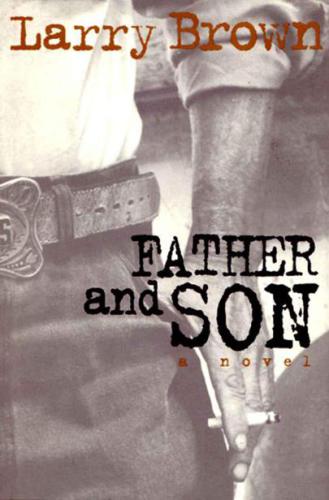
Father and Son
- اطلاعات
- نقد و بررسی
- دیدگاه کاربران
نقد و بررسی

Starred review from January 1, 1996
It takes formidable talent to mesmerize readers of a novel that focuses on a deeply flawed, unsympathetic protagonist, but Brown succeeds triumphantly in his most wise, humane and haunting work to date. On the first day that Glen Davis is released from the Mississippi state pen (after serving three years for running over a child while he was drunk), he kills two men; that night, he callously tells the mother of his toddler son that marriage is not part of his plans. On the second day, he rapes a teenaged girl. Glen is a despicable person--mean, icily remote, seemingly without conscience. Sheriff Bobby Blanchard is Glen's opposite; a kind and decent man, he epitomizes integrity and responsibility. Bobby is in love with Jewel, the mother of Glen's son, and their relationship is only one of the heartwrenching dramas played out here. Only halfway through the book do we learn that Bobby is Glen's half brother; both are sons of Virgil Davis, whom Glen demonizes and hates and whom Bobby wistfully wishes would acknowledge him. In fact, all of the characters are involved in a web of secret relationships, and much of the resonance of this suspenseful narrative is due to Brown's adroit pacing, as he releases surprising information gradually and with natural understatement. Despite Glen's coldhearted deeds, we come to understand him, too, as he progresses to a desperate act of rage and revenge. As in his previous novels, Brown (Dirty Work; Joe) uses lean, lyrical prose to evoke the cadenced speech and the atmosphere of the rural south in the 1960s, where everybody chainsmokes and drinks whiskey. Though he depicts a basic conflict of good and evil, however, Brown never reduces the issues to stark polarities. Most impressive here are Brown's compassionate view of human nature and his understanding of the subtleties of human behavior and the fabric of society, which, after tragedy reknits itself anew, to reaffirm the essential kinship of a community of souls. Author tour.

August 1, 1996
Glen Davis returns to his Mississippi Delta hometown in 1968 having served three years in prison for vehicular homicide. Fueled by guilt over his accidental shooting of his brother when they were children and anger at his drunken, neglectful father, Glen has a burning desire to even the score for every real and imagined slight he has suffered. The person who must stop him is his hated half-brother Bobby, the county sheriff and emblem of his father's infidelity and ill-treatment of his mother. A tale of brothers as much as fathers and sons, this novel is filled with the gritty, working-class realism of one of Bruce Springsteen's darker songs and resonates back to Cain and Abel and Jacob and Esau. Brown has come a long way since Facing the Music (LJ 9/15/88). For most public libraries.--Lawrence Rungren, Merrimack Valley Lib. Consortium, Andover, Mass.

July 1, 1996
It's 1968 near Oxford, Mississippi, and Glen Davis has come home from prison. He drinks and plots revenge against all who have wronged him, especially his father, a gentle, shiftless alcoholic whom Glen blames for his mother's death, and Sheriff Bobby Blanchard, who arrested the drunken Glen for manslaughter after he ran down a young boy with his car. Glen's girlfriend, Jewel, has waited faithfully for him, hoping to secure a husband and a father for their son, but Glen just wants sex. In fact, he's a predator, soon picking up a flirtatious teenager and raping her, then plotting rape against Blanchard's mother when Jewel rejects him for Blanchard. Glen may remind the reader of Joe Christmas in Faulkner's "Light in August": the two share a brooding anger and a confused parentage, and both become murderers. But Brown has no character such as Gail Hightower, crying out to deaf Heaven, nor is Glen tortured by racial schizophrenia. He's just a drunken psychopath. And Brown leaves a lot of loose ends: What are we to make of Glen's unwitting theft of his dead mother's money, for instance, or of the peaceful interlude when Glen goes fishing with an old friend? Where did this old friend come from? On the other hand, Brown muses on the legacies of fathers to sons quite effectively, avoiding every bromide. Not Faulkner by a long shot, but, as in Brown's gritty "Joe" (1991), there's great power here and almost unendurable suspense; Brown's two rape scenes visit with pure evil. ((Reviewed July 1996))(Reprinted with permission of Booklist, copyright 1996, American Library Association.)




دیدگاه کاربران